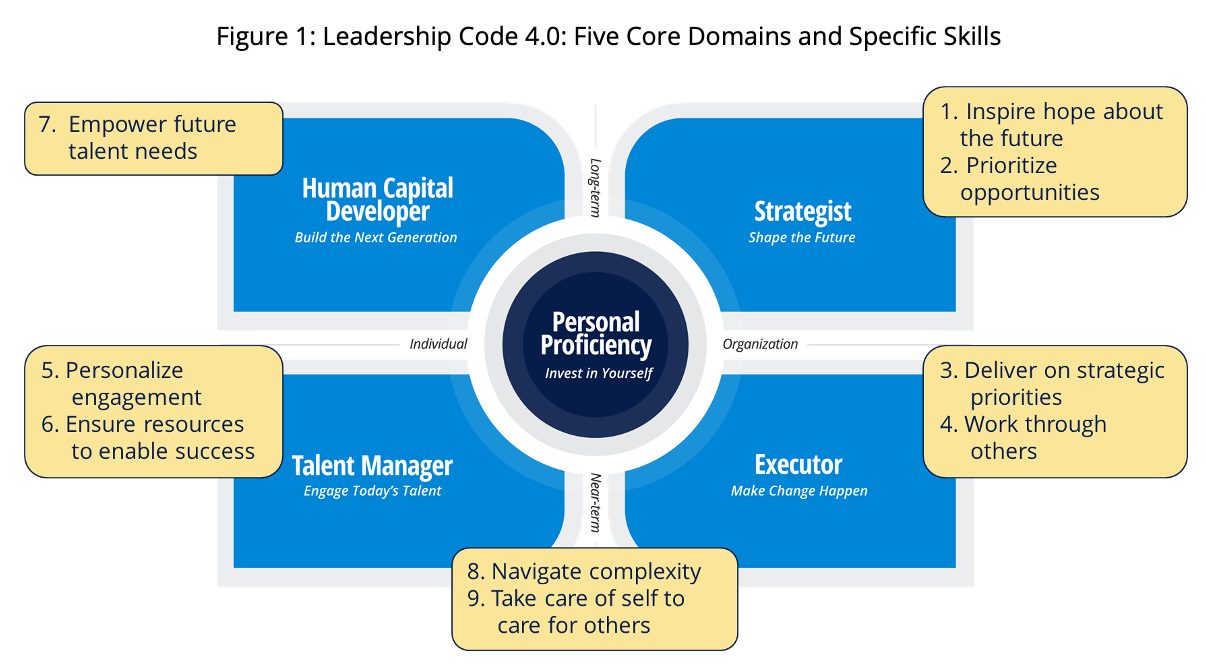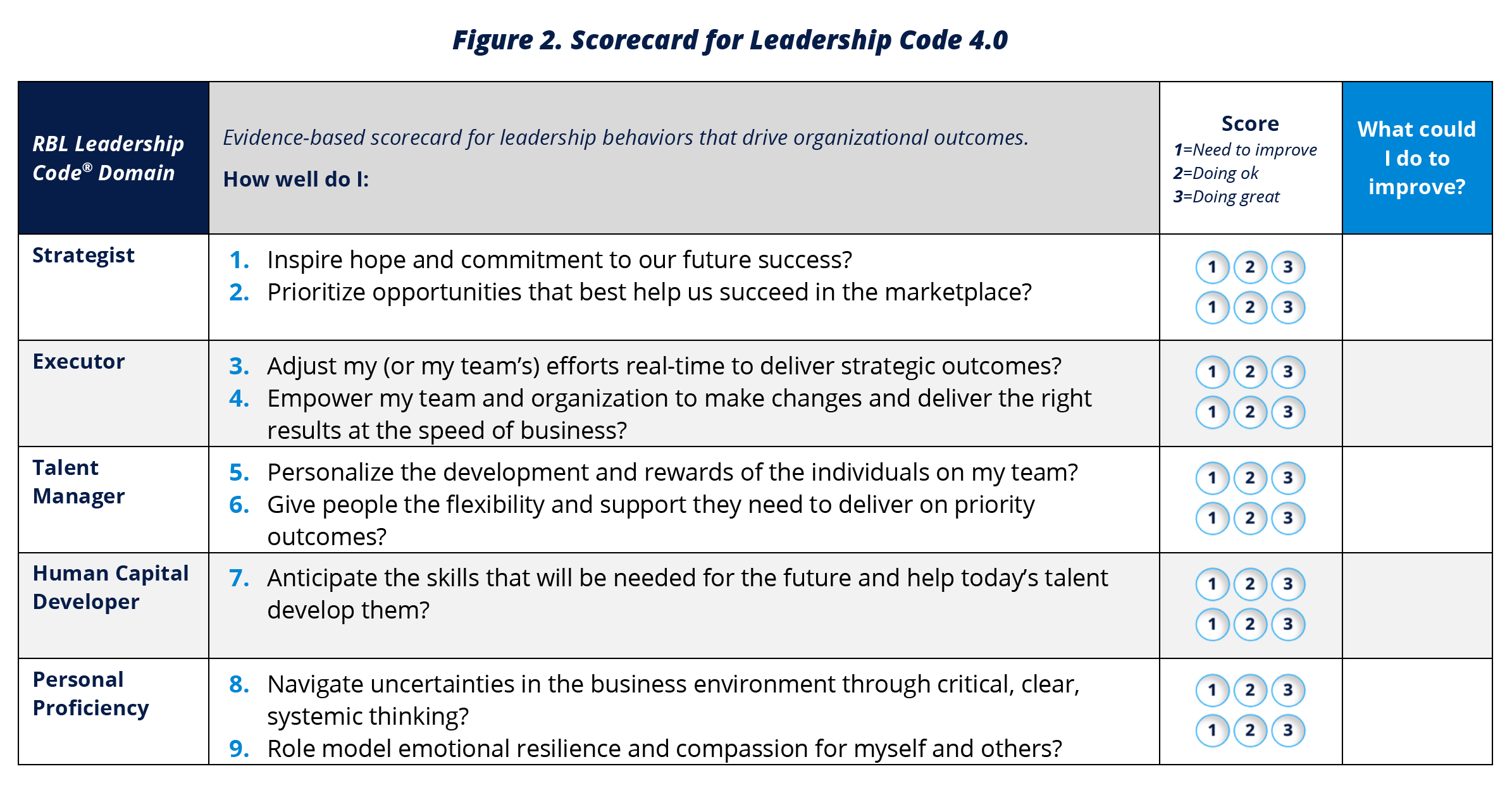Leadership Code 4.0: An Evidence-Based View of Effective Leadership
Key Takeaways:
- The RBL Leadership Code® highlights five core domains that remain timeless, but the specific behaviors within these domains must evolve to stay effective in today's complex world.
- Research identifies nine critical leadership skills essential for modern leaders, including inspiring hope, prioritizing opportunities, delivering strategic priorities, personalizing engagement, and navigating complexity.
- The RBL Group's extensive database, with over 2.3 million leadership behavior ratings, provides data-driven insights to help leaders develop the necessary skills for future success and drive organizational value.

Leadership Code 4.0: An Evidence-Based View of Effective Leadership

One day, a son asked his mother for the family’s traditional holiday ham recipe. She detailed each step while he took careful notes. She explained that she cuts off about an inch from each side before putting it in the oven to bake. Her son, eager to learn, asked why. His mother replied, “That’s how my mother always did it—I think because it improves the flavor.” After the conversation, the mother called her mother and asked, “Mom, why do you always trim the honey ham before baking it?” The grandmother said, “I have to trim the ham to fit it in my pan.”
Too often, leaders assume the formula for successful leadership lies in doing what has worked well in the past, and they invest time and resources to build skills accordingly. Are they right? Can the next generation of leaders be effective when they focus on legacy behaviors versus skills that deliver value today and tomorrow?
While many leadership attributes are timeless, we assert that in today’s complex world, leaders need to develop the right skills according to evidence-based research that identifies what leaders need to do to be effective today and in the future.
The Leadership Code® Research Initiative
The RBL Group (RBL) has a longitudinal Leadership Code® database with over 2.3 million leadership behavior ratings from over fifteen years. This database empirically defines effective leadership. We isolated more than 1.4 million ratings from over 19,500 respondents from the periods of 2015–2019 (pre–COVID-19) and 2021–2023 (post–COVID-19).
Using the RBL Leadership Code® research-based domains (Strategist, Executor, Human Capital Developer, Talent Manager, and Personal Proficiency), we analyzed which leadership behavior items correlate most strongly with organizational outcome variables (see our findings on first-line, mid-level, and executive leaders). These five Leadership Code domains have remained timeless, but the specific behaviors driving effectiveness in each of the five domains evolve and are timely.
What's New
We report the following nine evidence-based leadership skills (with data-driven tips) that have emerged as increasingly important in today’s world. See Figure 1 as an overview.

STRATEGIST
1. Inspire hope about the future. Hope comes from a belief in the organization’s future success. To create hope, leaders anticipate trends in the external environment that will impact what current and future customers and employees will need and want.
Tip: The highest performing leaders inspire hope and enthusiasm inside and outside the organization as they (a) shape a vision that succeeds in the marketplace, (b) clearly and consistently communicate that vision, and (c) provide clear, aligned goals that deliver the vision.
2. Prioritize Opportunities. Effective leaders build and execute a good strategy that evolves over time. In today’s world of rapid global change and increasing complexity, successful leaders adjust priorities quickly to take advantage of emerging market opportunities and avoid emerging threats.
Tip: The highest performing leaders tune in to business intelligence with data from the market context, key customers, and employees to adjust their own and their teams’/organization’s goals in real-time.
EXECUTOR
3. Deliver on strategic priorities. Today’s competing demands and heightened information flow requires leaders who can identify and deliver on key priorities.
Tip: Delivering on priorities separates base leaders from top performers. They make sure the most important outcomes are delivered by having the discipline to make priority actions happen.
4. Work through others. Leaders increasingly execute via influence, collaboration, and integration. Working through others means setting clear accountabilities, providing clear and consistent feedback, communicating transparently, and clearly defining and distributing decision-making protocols.
Tip: Top performers engage others to make change happen and give and receive actionable feedback to enable others to respond to the speed of business.
TALENT MANAGER
5. Personalize engagement. Today’s leaders help employees build their skills and experience to advance both the goals of the organization and the individual. Leaders understand what motivates and inspires each team member and shapes the work experience to inspire high engagement and performance.
Tip: High-performing leaders invest personal time to develop, coach, and mentor others based on what is uniquely meaningful to those individuals.
6. Ensure resources to enable success. Effective leaders provide the resources and support teams and individuals need to deliver on priorities. Leaders recognize rapidly changing market conditions, identify critical emerging skills, and allocate the resources to develop those skills.
Tip: High performers attract and retain the talent their teams need to win and provide teams the resources (money, technology, and information) needed to do the work.
HUMAN CAPITAL DEVELOPER
7. Empower future talent needs. As future skill requirements rapidly shift, leaders anticipate and proactively prepare for future talent needs by empowering employees to act on their own.
Tip: High-performing leaders have on-going, personalized career conversations with all employees to show how the organization helps them achieve their goals. And leaders ensure that future leaders get the right development experiences.
PERSONAL PROFICIENCY
8. Navigate complexity. Today’s leaders think in more complex, more integrative ways. They manage uncertainty to problem solve under greater pressures with greater speed and increased agility.
Tip: Effective leaders think clearly, critically, and systemically. They find certainty in uncertainty. They see the big picture, then derive organizational and individual implications. Navigating complexity allows them to provide better direction and make better decisions.
9. Take care of self to care for others. Leaders need to have sufficient emotional resilience and stress tolerance to remain personally positive and energized for the future and help others care for themselves.
Tip: High-performing leaders balance work and personal demands (well-being), treat others with humanity regardless of the circumstances, demonstrate compassion, and build trust. Leaders ensure that those they meet with feel better about themselves after each interaction.
Summary
As global social and economic unrest continues, economies will almost certainly face more, not fewer, uncertainties and stressors. But we are optimistic because our research identifies what leaders need to do to be effective.
While these nine actions are high level, our research has discovered specific behaviors for each. Our research highlights a positive, evidence-based argument for hope: the best leaders articulate an inspiring and informed strategy. They empower the organization to align to this strategy, and they gain feedback and insights from across and outside the organization to inform priorities. They are open and adjust. They personally invest in mentoring, coaching, and building talent. They help their organizations identify and build the skills needed to be successful for the future. They model well-being, balance, and inclusion. They inspire confidence and hope.
How prepared are you to successfully lead for the future (see Figure 2)?

This evidence-based formula presents a strategy to build effective leaders. You don’t need to continue past actions (“cut off the ends”) that are not going to be effective. Invest in building these key behaviors and we are confident you will drive strong organizational value not only for today but for tomorrow.
Sign up here for a detailed summary report coming soon of key findings for each leadership level from our 2024 Leadership Code Research Initiative.


